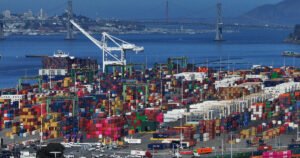GM lowers 2025 guidance, citing up to $5 billion in tariff exposure

DETROIT — General Motors on Thursday lowered its 2025 financial guidance to include an expected $4 billion to $5 billion impact as a result of President Donald Trump’s auto tariffs.
The Detroit automaker said its new guidance includes adjusted earnings before interest and taxes of between $10 billion and $12.5 billion. That compares with its former guidance, which did not take tariffs into account, of $13.7 billion to $15.7 billion.
GM’s 2025 guidance also includes net income attributable to stockholders of $8.2 billion to $10.1 billion, down from $11.2 billion to $12.5 billion, and adjusted automotive free cash flow of between $7.5 billion and $10 billion, down from $11 billion to $13 billion. The company did not change its capital spending target of between $10 billion and $11 billion, including its battery joint ventures.
The Detroit automaker also expects to spend $500 million during the second quarter to fix roughly nearly 600,000 SUVs and trucks that were recalled this week in the U.S. due to engine issues.
“Importantly, GM’s business is growing and fundamentally strong as we adapt to the new trade policy environment, further strengthen our supply base, and drive EV profitability,” GM CEO Mary Barra said in a shareholder letter on Thursday.
The guidance takes into account “the positive impact” of the Trump administration’s changes this week to some tariffs, which include reimbursing automakers for some U.S. parts and reducing the “stacking” of tariffs upon each other for the industry.
GM CFO Paul Jacobson told investors Thursday that the company continues to believe it can mitigate at least 30% of its expected cost increases due to tariffs through “self-help initiatives.” The guidance takes those actions into account, but the $4 billion to $5 billion impact this year does not, he said.
GM released first-quarter results Tuesday that beat Wall Street’s expectations but delayed its investor call and updated guidance details amid expected changes to the auto tariffs.
Barra on Thursday told CNBC’s Phil LeBeau that the company is working to offset as much of the increased costs from tariffs as possible.
“Absolutely, we can make changes. We’ve been working on our supply chain since 2019, to be more resilient,” Barra said, citing a 27% increase in U.S. sourced parts. “We have a lot of opportunity as we continue to work with our supply base to increase the U.S. content. You’ll see more announcements from us now that we actually have this clarity to be able to reinvest in the U.S.”
Barra declined to say whether the company would shift production from plants in Mexico to the U.S. She said the company will utilize its current assets. That includes 11 large assembly plants in the U.S. that employ tens of thousands of workers.
“We’re going to leverage that footprint that we have because we have the ability to add capacity to many of those plants. So we can do this efficiently, and it’s going to allow us to do this more quickly than if we were going to start with a greenfield,” Barra said.
Barra declined to say whether GM plans to raise vehicle prices as a result of the tariffs.
Jacobson told investors the automaker expects lower industry sales but for pricing to remain steady for the remainder of the year, providing a slight improvement compared to last year.
You may be interested

China turns to alternate beef imports as U.S. tariffs drive prices up
new admin - Jun 03, 2025IE 11 is not supported. For an optimal experience visit our site on another browser.Now PlayingChina turns to alternate beef…

Lily Seabird: Interview With Vermont Singer-Songwriter
new admin - Jun 03, 2025[ad_1] L ast spring, Lily Seabird was walking through downtown Burlington, Vermont, around 1 a.m., singing to herself. Still a…

Worry you left the front door unlocked? You’re just a typical British overthinker
new admin - Jun 03, 2025Almost three-quarters of people (70 per cent) admit to pondering more than they should, with a quarter (24 per cent)…
































